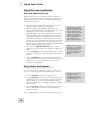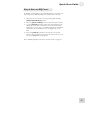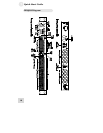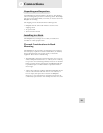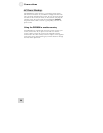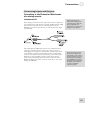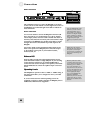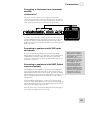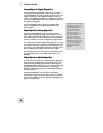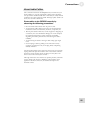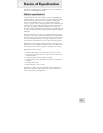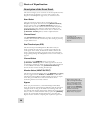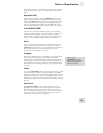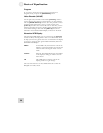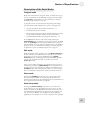
2 Connections
Analog Signal In, Digital Signal Out Analog Signal In, Digital Signal Out
In this configuration, the DEQ830 can be used to “translate” an
analog signal to the digital domain. A likely scenario would be
using the DEQ830 as an analog-to-digital converter between your
submix outputs and an Alesis ADAT. In addition to acting as a
“gateway,” the DEQ830 would allow you to shape the sound and
send it to the ADAT digitally, without the additional noise that can
be added by an analog EQ.
In this configuration, the DEQ830 can be used to “translate” an
analog signal to the digital domain. A likely scenario would be
using the DEQ830 as an analog-to-digital converter between your
submix outputs and an Alesis ADAT. In addition to acting as a
“gateway,” the DEQ830 would allow you to shape the sound and
send it to the ADAT digitally, without the additional noise that can
be added by an analog EQ.
D
igital audio offers a decided
advantage over analog audio
when passing the signal
through multiple devices. The
various stages of analog
circuitry can cause the
quality of the signal to
deteriorate rapidly; however,
once a signal has been
converted to the digital
domain, it can be carried
f
rom device to device with a
minimal loss of integrity. This
is why it is advantageous to
p
ass the signal through the
D
EQ830 using its ADAT
Optical jacks whenever
p
ossible.
To use the DEQ830 in this way, connect the ADAT Optical
output of the DEQ830 to the ADAT Optical input of the
receiving device.
To use the DEQ830 in this way, connect the ADAT Optical
output of the DEQ830 to the ADAT Optical input of the
receiving device.
Digital Signal In, Analog Signal Out Digital Signal In, Analog Signal Out
In this setup, the DEQ830 also serves as a signal converter,
making it possible to take the digital submix outputs of an 8-bus
mixer, apply some EQ and then send the result as an analog signal
into a sound system— the Alesis ProActive 5.1 Surround Sound
System, for example, or a series of independent onstage monitors.
In this setup, the DEQ830 also serves as a signal converter,
making it possible to take the digital submix outputs of an 8-bus
mixer, apply some EQ and then send the result as an analog signal
into a sound system— the Alesis ProActive 5.1 Surround Sound
System, for example, or a series of independent onstage monitors.
If an analog mixer has limited channel EQ capabilities, you could
run the digital signal from an ADAT into the DEQ830, and from
there take it to your mixer’s analog inputs. This would allow you to
take advantage of the DEQ830's extensive EQ and simply use the
mixer for setting the levels and pan positions of the signals.
If an analog mixer has limited channel EQ capabilities, you could
run the digital signal from an ADAT into the DEQ830, and from
there take it to your mixer’s analog inputs. This would allow you to
take advantage of the DEQ830's extensive EQ and simply use the
mixer for setting the levels and pan positions of the signals.
For these situations, be sure to connect the ADAT Optical output
of the transmitting device to the ADAT Optical input of the
DEQ830.
For these situations, be sure to connect the ADAT Optical output
of the transmitting device to the ADAT Optical input of the
DEQ830.
Digital Signal In, Digital Signal Out Digital Signal In, Digital Signal Out
In cases where every device in your audio chain has a digital audio
input and output, the DEQ830 is right at home. Simply pass the
audio from the transmitting device’s ADAT Optical output into
the DEQ830’s ADAT Optical input, use it to sculpt the signal, and
then pass the audio on to the next device by connecting the
DEQ830’s ADAT Optical output to the ADAT Optical input of
the receiving device.
In cases where every device in your audio chain has a digital audio
input and output, the DEQ830 is right at home. Simply pass the
audio from the transmitting device’s ADAT Optical output into
the DEQ830’s ADAT Optical input, use it to sculpt the signal, and
then pass the audio on to the next device by connecting the
DEQ830’s ADAT Optical output to the ADAT Optical input of
the receiving device.
Operating the DEQ830 in any of the three configurations
described above is really no different from using it in a completely
analog system. For that reason, from this point on in the manual
we will make no distinction between operating the DEQ830 in the
digital or analog domains.
Operating the DEQ830 in any of the three configurations
described above is really no different from using it in a completely
analog system. For that reason, from this point on in the manual
we will make no distinction between operating the DEQ830 in the
digital or analog domains.
24 24



